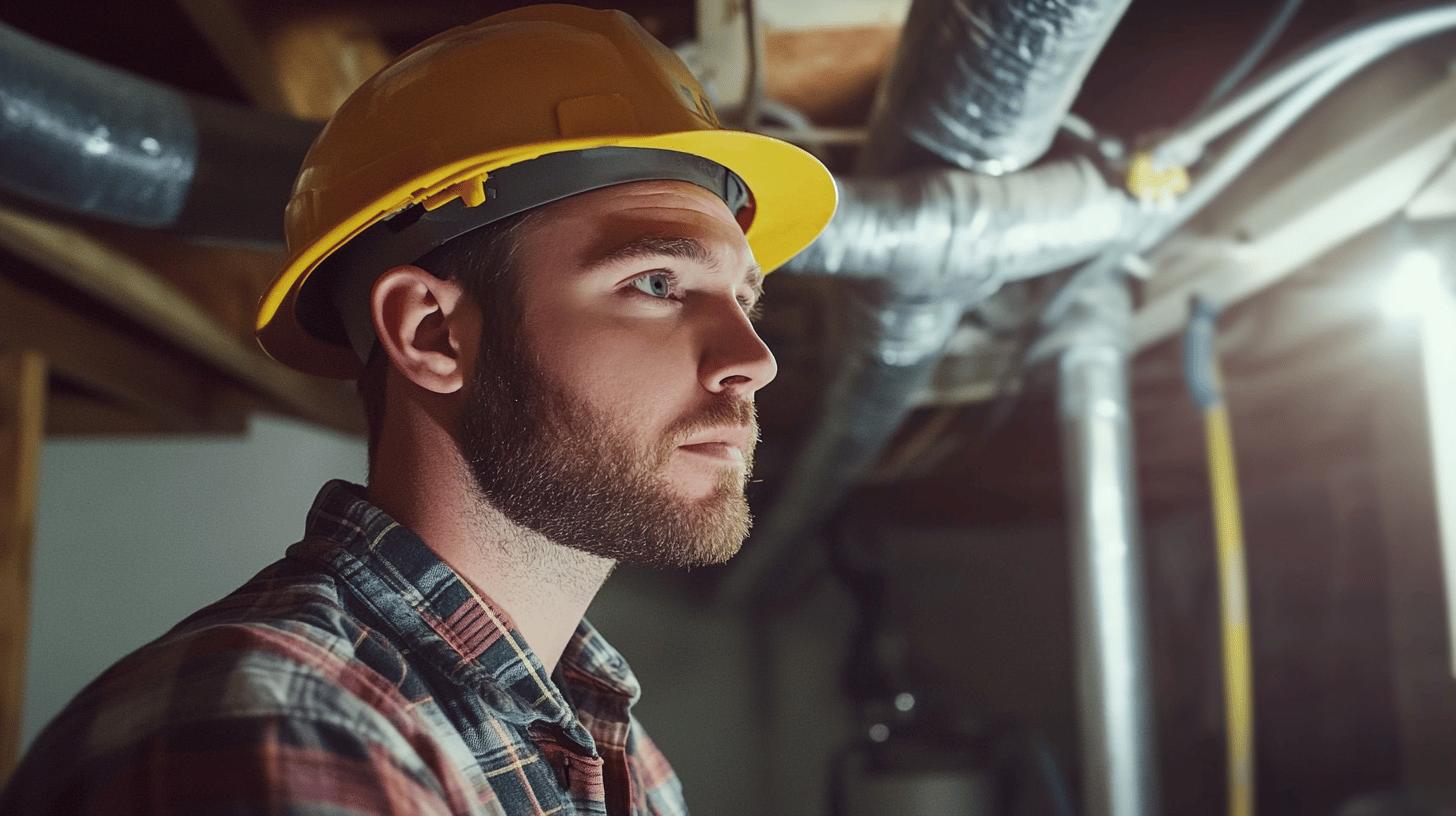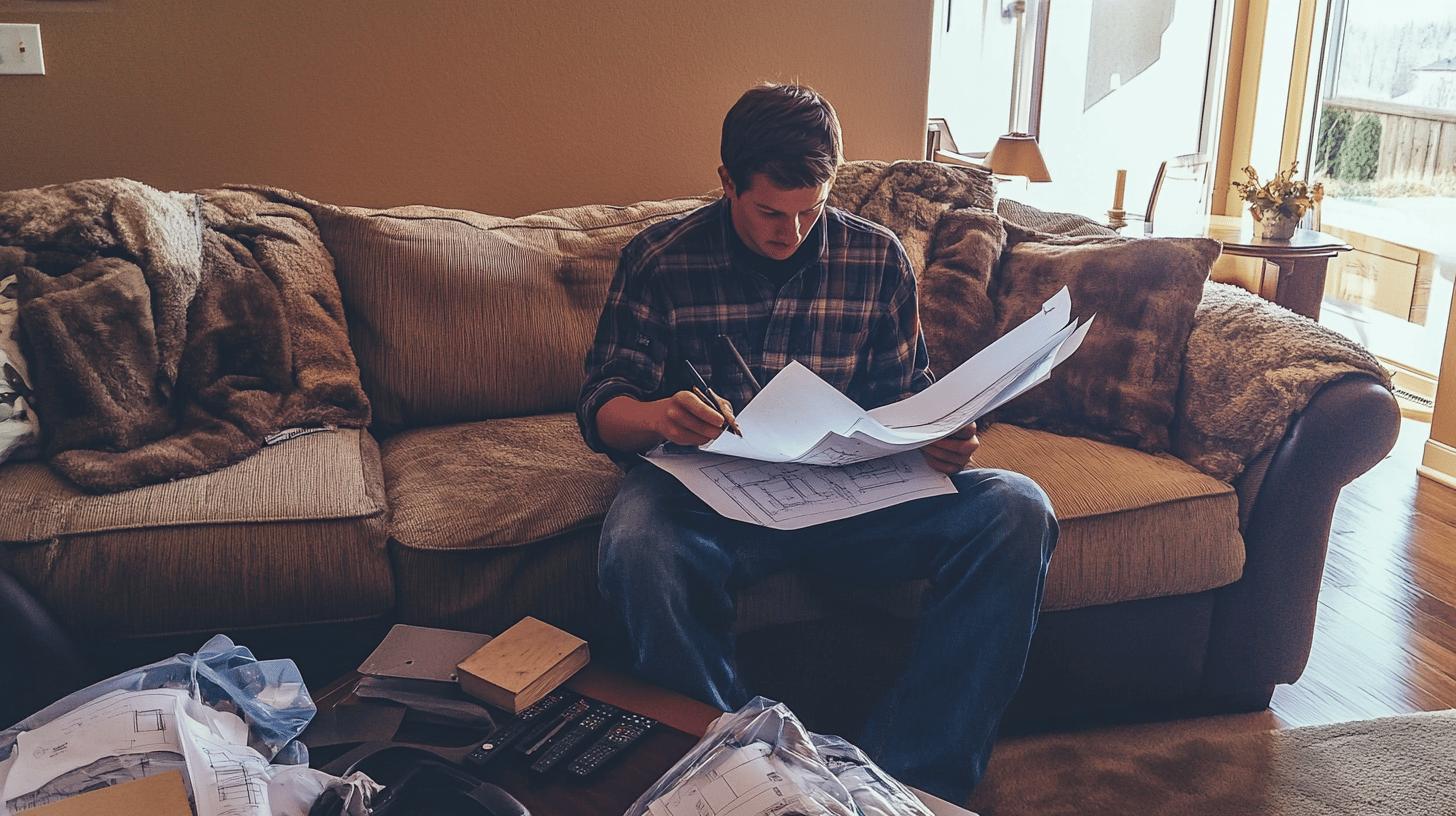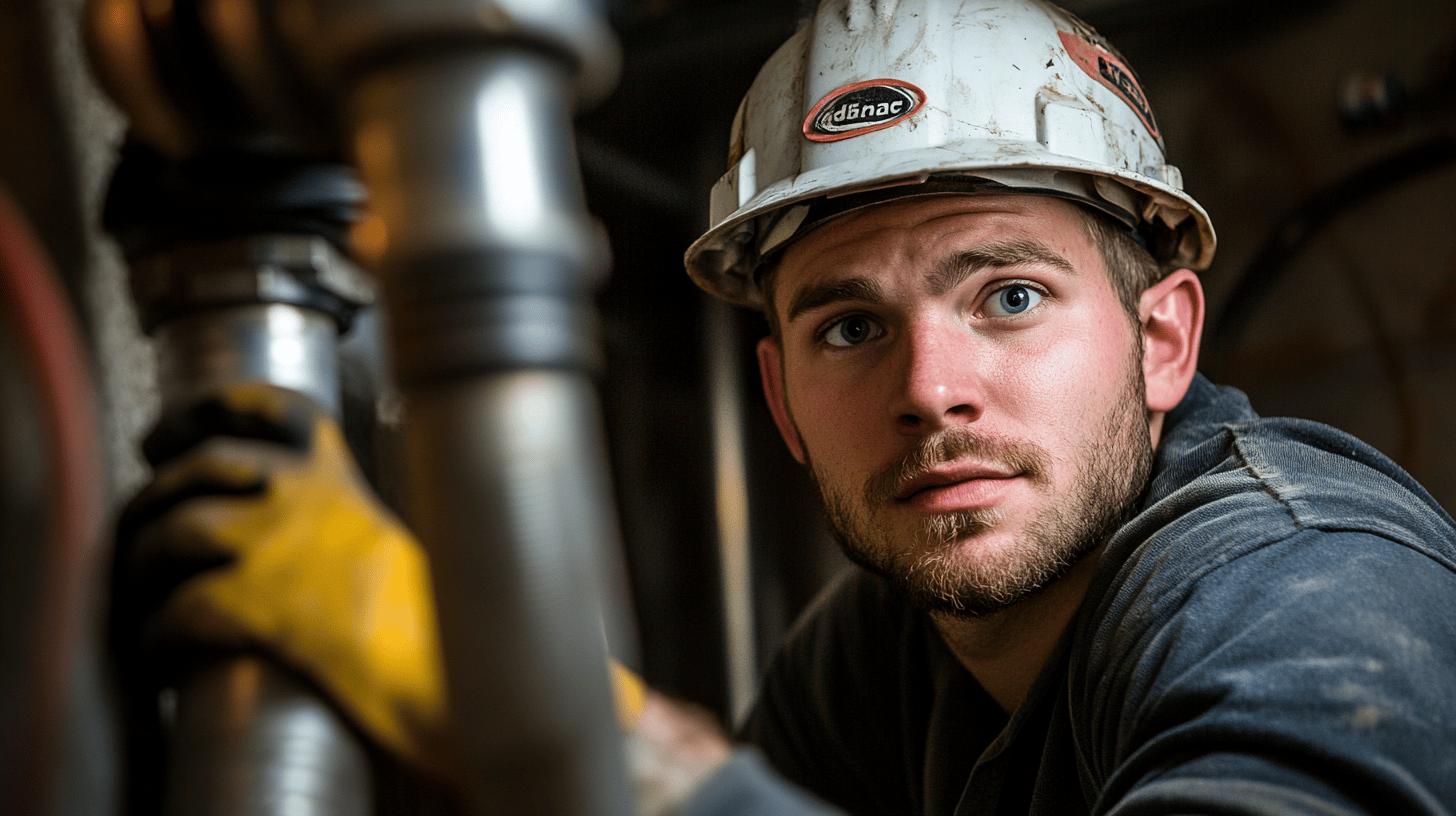TL;DR:
- Polybutylene pipes fail within 10-15 years, causing leaks and serious water damage.
- Replacement is essential to prevent costly repairs and protect property value.
- Recommended replacement materials: Copper (durable, corrosion-resistant), PEX (flexible, cost-effective), PVC (resilient).
- Identifying polybutylene pipes: Look for gray, blue, off-white, silver, or black colors, and “PB2110” stamp.
- Replacement costs range from $1,500 to $20,000, influenced by size and material.
- Professional evaluations are critical for assessing condition and ensuring code compliance.
- Proper planning and contractor selection can minimize damage and ensure quality work.
Are your pipes a hidden problem waiting to happen? Many homes still use polybutylene pipes, which were once popular for being cheap but are now known to fail over time. They can break down when exposed to chemicals in water, leading to leaks, water damage, and expensive repairs. Knowing the risks of these pipes is important if you’re thinking about an upgrade. Check out this post to learn why switching out polybutylene pipes can help protect your home and give you peace of mind.
Understanding Polybutylene Pipe Risks
Polybutylene pipes were a hit for being cheap and easy to install, but they’re now known for breaking down quickly, especially when exposed to things like chlorine in water. Within 10 to 15 years, they often start leaking or cracking, which can lead to major water damage, rot, and mold—repairs that don’t come cheap. Since fixing polybutylene pipes is tough, replacement is usually the best move.
You’ll know these pipes are failing if you notice frequent leaks, discolored water (showing internal breakdown), or lower water pressure from clogs and weaknesses. The biggest problem is that the pipes can suddenly burst due to their material wearing out, leading to costly damage and possibly lowering your home’s value. Mold from leaks is also a health risk, so swapping out these pipes for more durable ones can help keep your home safe and sound.
Reasons to Replace Your Polybutylene Pipes

Why replace your polybutylene pipes? Upgrading prevents the leaks and bursts these pipes are known for, keeping your home safe from water damage and costly repairs. Newer materials like copper or PEX are stronger and built to last, so your plumbing can handle everyday use without sudden breakdowns. Plus, switching to modern pipes improves water quality since they’re less likely to carry contaminants from older systems.
- Copper: Durable and corrosion-resistant, copper is a solid choice for plumbing updates.
- PEX: Flexible and easy to install, PEX reduces labor costs and time.
- PVC: Cost-effective and resilient, suitable for numerous plumbing applications.
- Improved Fittings: Modern fittings lower leak risks and boost system performance.
- Water Quality: New pipes provide cleaner water, free from rust and particles.
Replacing polybutylene pipes can increase your home’s resale value since buyers look for homes with reliable, modern plumbing. This upgrade not only strengthens your home but also makes it more attractive to the market. Plus, you’ll get a more efficient plumbing system with consistent water pressure, making everyday life a little easier.
Identifying Polybutylene Plumbing in Your Home
Wondering if your home has polybutylene pipes? Look for small, flexible pipes in gray, blue, off-white, silver, or black. Check for a “PB2110” stamp, usually found near the main shutoff valve—start your search there!
| Color | Location |
|————|——————————–|
| Gray | Near water heaters, main valves|
| Blue | Exterior walls, basements |
| Off-white | Bathrooms, under sinks |
| Silver | Kitchens, laundry areas |
| Black | Crawl spaces, attics |
While a quick self-check is helpful, it’s best to get a pro involved. A plumber can confirm your pipe type, assess their condition, and spot any risks. They’ll give you expert advice on the next steps, helping keep your plumbing safe and reliable.
Cost Implications of Replacing Polybutylene Pipes

Replacing polybutylene pipes can run between $1,500 and $20,000, depending on your home’s size and the material you choose. Copper is more expensive but lasts longer, while PEX or PVC is often more affordable for smaller homes. Even though prices vary, investing in a dependable plumbing system is worth the peace of mind.
- Permits: Permit costs range from $70 to $400, based on local rules.
- Inspection Fees: Inspections add $50 to $150.
- Labor Costs: Skilled plumbers’ fees are crucial for quality work.
- Miscellaneous Expenses: Include extra fittings or unforeseen repairs.
Replacing polybutylene pipes has solid financial perks. Newer plumbing prevents surprise repair costs by reducing leaks and bursts, saving you from expensive water damage. Homes with updated plumbing are also more attractive to buyers, often boosting resale value. Investing in reliable pipes not only protects your property but also adds market appeal, making it a smart financial move.
Expert Recommendations for Polybutylene Pipe Replacement
Experts say replacing polybutylene pipes is all about reliability. These pipes often fail because they break down over time. Copper and PEX are popular replacements—copper is long-lasting and resists corrosion, while PEX is flexible and lowers labor costs. Both options make for a more dependable plumbing system and cut down the risk of leaks and bursts.
How important is it to get a pro’s opinion? It’s essential. Pros can accurately check the condition of your polybutylene pipes and guide you on the best replacement options. A skilled plumber can spot potential issues, give a detailed quote, and ensure everything meets code. Professional assessments help the job go smoothly, keeping disruptions minimal and securing your home against future plumbing problems.
Case Studies on Successful Replacements
Real-life examples show the advantages of replacing polybutylene pipes. In one case, a family switched to copper pipes, eliminating leaks and boosting their home’s value. Another homeowner saw increased buyer interest thanks to upgraded plumbing. These stories highlight that replacing old pipes not only improves plumbing safety and reliability but also raises property value.
Planning and Preparing for Pipe Replacement

How do you pick the right contractor for replacing your pipes? It’s important to choose carefully. Start by looking for licensed and insured plumbers who have experience with polybutylene pipe replacements. Check their references and read reviews to gauge their reliability. Getting multiple quotes can help you find the best price. The right contractor will ensure quality work that meets safety standards and building codes.
- Clear the Work Area: Move items away from work zones to prevent damage.
- Protect Flooring: Use floor covers to protect from scratches and debris.
- Plan for Water Shutoff: Coordinate with your contractor on water downtime.
- Minimize Wall Openings: Discuss reducing openings to cut repair needs.
- Communicate with the Contractor: Stay in touch to resolve concerns during the project.
Making sure your pipe replacement follows the rules and minimizes damage is super important. Skilled plumbers are familiar with local codes and ensure everything meets the standards. Plus, experienced contractors work to keep your home damage to a minimum, protecting your walls and floors. With solid planning, the replacement process goes smoothly, giving you peace of mind while you upgrade your plumbing.
Final Words
Addressing polybutylene pipes in your home is essential for keeping things safe and maintaining your property’s value. Knowing the risks—like leaks and water damage—helps you spot signs of failure. Upgrading to modern materials like copper or PEX not only improves water quality but can also boost your home’s resale value. While considering the costs and planning involved in replacement, you’ll be preventing future expenses and protecting your investment. Expert advice highlights the need for timely action. So, should you replace your polybutylene pipes? With all this info, it’s pretty clear that you should.
FAQ
Should I replace my polybutylene pipes?
Polybutylene pipes should be replaced due to their tendency to degrade, leading to frequent leaks, water damage, and potential mold issues. Modern materials like copper or PEX offer improved durability and safety.
How much does it cost to replace polybutylene pipes?
The cost to replace polybutylene pipes ranges from $1,500 to $20,000, depending on the size of your home and material choices. Factors such as permits and inspections can add to the overall expense.
Should I buy a house with polybutylene pipes?
Buying a house with polybutylene pipes can pose significant risks due to potential plumbing failures. It’s advisable to evaluate the costs of replacement and consider negotiating these into your purchase offer.
How can I identify polybutylene pipes in my home?
Polybutylene pipes are flexible, small, and often gray, blue, or black. They typically have a “PB2110” stamp and are located near the main shutoff valve. Professional inspections help confirm their presence.
Can you sell a house with polybutylene pipes?
While it is possible to sell a house with polybutylene pipes, disclosure is critical, as potential buyers may be wary of future plumbing issues. Consider replacing the pipes to enhance marketability.
What do you do if your house has polybutylene pipes?
If your house contains polybutylene pipes, planning a replacement is advised. Hiring a professional to evaluate, quote, and execute the upgrade will help ensure a successful transition to modern plumbing.
What is the average lifespan of polybutylene pipes?
Polybutylene pipes generally last between 10 to 15 years before experiencing issues like leaks and breaks caused by material degradation. Regular inspections can identify warning signs before failures occur.
Is it worth replacing polybutylene pipes?
Replacing polybutylene pipes is worthwhile, as it prevents water damage, improves the home’s resale value, and ensures better water quality. The long-term benefits often outweigh the initial costs.
What are expert recommendations for replacing polybutylene pipes?
Experts recommend using copper or PEX materials for replacing polybutylene pipes. These options provide better reliability and durability, which, along with professional evaluations, offer peace of mind.

